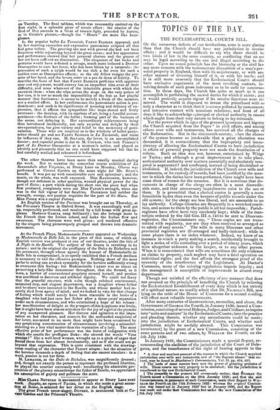At the French Plays, Mademoiselle PLESSY appeared on Wednesday as
Mademoiselle de Belle Isle, in the piece of that name, of which an English version was produced at one of our theatres, under the title of A Night in the Bastile. The subject of the drama is revolting in its nature; and in the original the profligacy of the Duke de Richelieu and his paramour, through whose agency the honour of Mademoiselle de Belle Isle is compromised, is so openly exhibited that a French medium is necessary to veil the offensive passages. Nothing short of the most pathetic acting can awaken sympathy for the heroine sufficiently strong to overcome this feeling: but Mademoiselle I LEAST was so intent on preserving a lady-like demeanour throughout, that she formed, as it -were, a barrier of conventional propriety around herself, and passion was sacrificed to decorum and artificial dignity. We could not fancy that the graceful creature, with calm though subdued countenance, measured step, and elegant deportment, was a daughter whose father and brothers were immured in the Bastile, and whose mother had re- cently died from agony of mind; and we looked in vain for that change of feeling which would surely have been traceable in the looks of a daughter who had just seen her father after a three-years' separation under such circumstances, and who entertained a hope of his release : her manifestation of delight at the prospect of this happiness was lively, but it might have been almost mistaken for the joy of a girl at the promise of any unexpected pleasure. Her distress and agitation at the impu- tation on her character, and concern for the unfounded suspicions of her lover, amounted to no more than might have been occasioned by any perplexing concatenation of circumstances involving a misander- standing on a less vital matter than the reputation of a lady. The most effective point of her performance was the burst of indignation with which she assails the profligate Duke : she uttered the words " Vous meole!!" like a well-bred woman wrought up to a pitch of anger that !breed them from her almost involuntarily, and as if she could not go beyond that expression. This is quite consistent with the drawing- room reading of the character that PLEssv adopts ; hut the situation of the heroine demands a depth of feeling that she cannot simulate : in a word, passion is not her forte. M. LEMADRE, as the Duke de Richelieu, was magnificently dressed ; and, though not exactly the person to represent the professed libertine, he played the courtier extremely well: recollecting his admirable per- sonation of the gloomy misanthrope the father of Estelle, we appreciated has assumption of gayety and politesse the more.


























 Previous page
Previous page